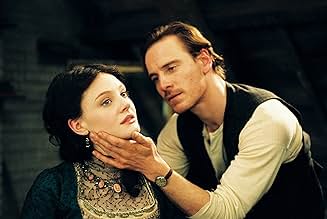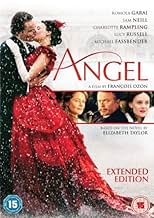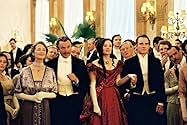IMDb-BEWERTUNG
5,8/10
5714
IHRE BEWERTUNG
Der Aufstieg und Fall eines jungen exzentrischen britischen Schriftstellers, Anfang des 20. Jahrhunderts.Der Aufstieg und Fall eines jungen exzentrischen britischen Schriftstellers, Anfang des 20. Jahrhunderts.Der Aufstieg und Fall eines jungen exzentrischen britischen Schriftstellers, Anfang des 20. Jahrhunderts.
- Auszeichnungen
- 1 Gewinn & 3 Nominierungen insgesamt
Geoffrey Streatfeild
- Sebastian
- (as Geoffrey Streatfield)
Ausgewählte Rezension
It starts quite strangely for a movie about the life of a romantic novel writer in the early XX century Britain, with a wannabe Danny Elfman's music, an ugly pink opening, and an actress obviously too old for the part she plays. But, as the movie goes on, if the strangeness still remains, all this elements begin to make sense and create and original, and I think, never experimented on screen, world. ANGEL is indeed a really good surprise if you manage to accept and enter the inner world that the movie describes, and the kitsch atmosphere of Ozon's style (witch was for me unbearable in his previous movies, like "8 Femmes", but that absolutely fits the subject of this movie). When I learned that Ozon directed a movie in English about a young artist, I was waiting for a sort of kitsch version of ESTER KAHN (the wonderful movie another French director Arnaud Despechin made about a young lady in Britain in the early XX century), but I couldn't be more wrong : ANGEL is a sort of feminine (or Gay) version of Tim Burton's ED WOOD, describing how a strong imagination no matter how bad it is can completely recreates the world, and how you can fully lives in a fantasy universe, when you believe hard enough in your talent and your art .
The movie tells us the life of Angel (Ramola Garai, who has everything to become the new Ludivine Sagner for François Ozon), from her childhood, where she dreams, upstairs the family's grocery, of the fastidious and glamorous life of a famous writer, to her success in the house of her dreams : Paradise house, where she has everything she ever dreamed of when she was young. The originality of this movie is that everything is seen with Angel's eyes. And her eyes only see what her imagination tells them to see, for she doesn't live in reality, but always fills it with dreams, so that she can live as if she were one of her romantic heroine. Whatever awful and sad the word might be, it never touches Angel, for she always transforms it with her imagination the way she wants. And imagination, she has plenty... Of course, her world is a childish, puerile and kitsch world of a bad Barbara Cartland 's novel and the movie completely recreates it on screen, with all the artifices it supposes : from the colors that explains the pink to the situations : when she proposes Esme, the man she chooses to love, the rain suddenly stops when he says yes, and a rainbow appears : empirical reality doesn't exist here, for Angel is unable to see it. But, and here's the all interest of the movie, the spectator, on the other hand, is absolutely able to watch it.
This tension between the strong believing that Angel puts in her world, and the ridiculous that the spectator sometimes sees in it, is mostly tangible thought other character's eyes (like Charlotte Ramplin is the more judgmental, she's the first to condemn Angel's books, but mostly for personal reasons : she can't stand the pretentious and rude young lady with whom her husband is falling in love, or Esme, the untalented painter, who is also one of this ambiguous character, for he accepts his wife universe, but is unable to really find his place in this fictive world). And the movie constantly plays with this two degrees, witch brings humanity, cruelties and sadness to the shinny but unreal world it describes. That's also why this movie is so surprising : we never know exactly where we are : is this a dream, when will it stops, will reality goes after it in the end ? This constant instability regenerates the spectator interest for this movie, and keep it far from the classical costumed movie about the rise and fall of an English women writer it could have been.
That's also why this movie reminds me of Tim Burton's ED WOOD, for, beyond their differences, they both deal with the same thematic of the triumph of an artistic imagination over the world, and the fall that fallows this triumph, and they also share a melancholic tone, as well as real understanding and compassion for untalented but passionate artists.
The movie tells us the life of Angel (Ramola Garai, who has everything to become the new Ludivine Sagner for François Ozon), from her childhood, where she dreams, upstairs the family's grocery, of the fastidious and glamorous life of a famous writer, to her success in the house of her dreams : Paradise house, where she has everything she ever dreamed of when she was young. The originality of this movie is that everything is seen with Angel's eyes. And her eyes only see what her imagination tells them to see, for she doesn't live in reality, but always fills it with dreams, so that she can live as if she were one of her romantic heroine. Whatever awful and sad the word might be, it never touches Angel, for she always transforms it with her imagination the way she wants. And imagination, she has plenty... Of course, her world is a childish, puerile and kitsch world of a bad Barbara Cartland 's novel and the movie completely recreates it on screen, with all the artifices it supposes : from the colors that explains the pink to the situations : when she proposes Esme, the man she chooses to love, the rain suddenly stops when he says yes, and a rainbow appears : empirical reality doesn't exist here, for Angel is unable to see it. But, and here's the all interest of the movie, the spectator, on the other hand, is absolutely able to watch it.
This tension between the strong believing that Angel puts in her world, and the ridiculous that the spectator sometimes sees in it, is mostly tangible thought other character's eyes (like Charlotte Ramplin is the more judgmental, she's the first to condemn Angel's books, but mostly for personal reasons : she can't stand the pretentious and rude young lady with whom her husband is falling in love, or Esme, the untalented painter, who is also one of this ambiguous character, for he accepts his wife universe, but is unable to really find his place in this fictive world). And the movie constantly plays with this two degrees, witch brings humanity, cruelties and sadness to the shinny but unreal world it describes. That's also why this movie is so surprising : we never know exactly where we are : is this a dream, when will it stops, will reality goes after it in the end ? This constant instability regenerates the spectator interest for this movie, and keep it far from the classical costumed movie about the rise and fall of an English women writer it could have been.
That's also why this movie reminds me of Tim Burton's ED WOOD, for, beyond their differences, they both deal with the same thematic of the triumph of an artistic imagination over the world, and the fall that fallows this triumph, and they also share a melancholic tone, as well as real understanding and compassion for untalented but passionate artists.
- moimoichan6
- 27. März 2007
- Permalink
Handlung
WUSSTEST DU SCHON:
- WissenswertesThe story is inspired by the life of Marie Corelli.
- Zitate
Angel Deverell: [from trailer] Everyone told me my dreams were lies. All I wanted was to make it true.
- VerbindungenReferenced in Eine neue Freundin (2014)
Top-Auswahl
Melde dich zum Bewerten an und greife auf die Watchlist für personalisierte Empfehlungen zu.
- How long is Angel?Powered by Alexa
Details
Box Office
- Budget
- 14.900.000 € (geschätzt)
- Weltweiter Bruttoertrag
- 2.835.903 $
- Laufzeit1 Stunde 59 Minuten
- Farbe
- Sound-Mix
- Seitenverhältnis
- 1.85 : 1
Zu dieser Seite beitragen
Bearbeitung vorschlagen oder fehlenden Inhalt hinzufügen

Oberste Lücke
By what name was Angel - Ein Leben wie im Traum (2007) officially released in India in English?
Antwort

































